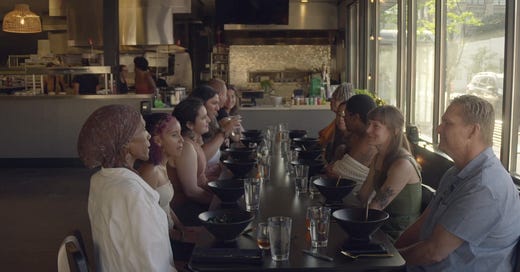When I co-founded BIPOC Foodways Alliance, I was in a transitional life phase.
I was deeply angry at the restaurant industry for setting us up as “essential workers,” putting us in the front line of danger so that other people, more privileged than us, could still get restaurant quality food when they wanted it— even though we were living through a literal plague.
My other career, media, has been broken for a long time, and is currently collapsing by the moment.
I suppose I was having a garden variety mid-life crisis when a friend asked the old question: What would you do every day if you didn’t have to do it?”
“Throw dinner parties,” I answered without hesitation.
My generation (Gen X 4 Lyfe!) came of age in the era of the dinner party. As hard as it is to believe, when we wanted to connect or gather with friends, we didn’t usually rush out to a restaurant or even a bar. We went to each other’s houses. At the risk of sounding like I’m 172 years old, I sent dinner invites via snail mail. (No such thing as text messages.) And— get this— people were expected to RSVP! Like, how else would I know how much fish to buy?
We set the table, sometimes with seating arrangements, we set folded linen napkins, we lit candles and filled vases with flowers. We turned on music (nothing bugs me more than being “entertained” in a silent room).
And our friends showed up. Sometimes they weren’t even friends, but friends of friends, colleagues, acquaintances, neighbors, even strangers.
And you know what? This is how friendships were forged. Not staring into some screen, but staring across one another over a table, over shared plates of food, and connecting.
My mother, dismayed at why I chose to shift into the food industry after she toiled to put me through college so I could become a writer, had a young me explaining: “It’s because of the conviviality we create through cooking and serving that food.”
Remember conviviality?
Conviviality = friendliness, agreeability, sharing, storytelling, camaraderie. In other words, the things that make us human.
At BIPOC Foodways Alliance, our mission is to get in touch with each other’s shared humanity. To shake off any of this moment’s frenzy towards looking at people who seem different from us as the “other.” History is rife with the dangers of this, and yet, here we are.
I believe stories should be told by the people who have lived those stories. And cooking is a language— one of the most universal and articulate ones known to all of humanity.
Marginalized communities– people of color, women, immigrants, and elders– have traditionally been pushed into the edges of history– and in many cases, left out altogether. And remember— history means “story”— a narrative, an account, a record keeping. And these things shape the future.
Our stories matter.
Traditional food media storytelling often has an extractive quality— what will I “get” if I eat at this or that restaurant? Go there, order a plate of food, have a good (or sometimes a bad) meal, pay up, then leave. Most of the time we have no idea who cooked our food or why.
Home cooking— the dinner party— inverts that model. Instead of a question of commerce, we now have a question of sharing. Because we want to. Because we care about each other. Because we want to offer up, and receive, some type of meaningful exchange.
I have always believed in the power of the dinner party. And now I throw the world’s best ones— where strangers become not just friends, but allies who expand, and recognize each other’s humanity, just by being present.
Check out the vid for some highlights of last year’s dinner parties.
Videography by: Serena Hodges
Special thanks to our co-hosts Sarah White, Vivian Mims, Marianne Abdinur, and Phon Sann and Tevy Phann.







Share this post